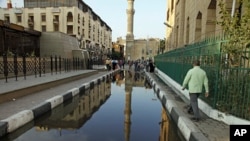Some of Egypt's minority Sufi Muslims are warning against the growing influence of Islamic fundamentalism in national politics. Adherents of the mystical form of Islam are holding a rally in Cairo's Tahrir Square Friday to make the case for a tolerant, civilian Egyptian state.
The gathering has adopted the slogan "For the Love of Egypt," arguing for a new government that embraces the political and religious spectrum rather than the fundamentalist vision of an Islamic state.
Fundamentalist Muslim rally causes apprehension
Alaa Abu al-Azayem, head of the al-Tahrir political party and leader of the Azmiya Sufi sect says his group's participation in the rally - the first time members have called for such action - comes in direct response to a rally late last month of tens of thousands of fundamentalist Muslims.
He says the July 29th protest caused fear for all Egyptians, Christians and Muslims, warning that if "those people" came to rule the country, they would make anyone who opposes them "disappear."
It's a dire prediction, but al-Azayem is not alone in his fears. Calls by Salafi and Wahabi groups for a strict interpretation of Sharia law in the new Egyptian constitution have raised alarm among the country's Christians, secularists and more moderate Muslims.
Those groups had planned to take part in Friday's mass iftar - the Ramadan evening meal - but many have decided to postpone the gathering for a week after meeting with Prime Minister Essam Sharaf.
Those in favor of the delay, including secularists, other Sufi sects as well as the nation's leading Islamic political group, the Muslim Brotherhood, say they are waiting for a government announcement in the coming days on the constitutional drafting process.
Another reason given for the delay is the toll the protests are taking on Egyptians, with those in favor of postponement arguing that the focus should now be on upcoming elections. Moreover, they say, the weekly rallies are hurting the economy.
But Sufi leader Al-Azayem counters that allowing fundamentalists to dominate the political dialogue could be equally problematic - and points to the fall in the Egyptian stock market after the Islamist show of force last month.
Al-Azayem adds that the purpose of Friday's meeting is to assure the Egyptian public that "a peaceful force exists", one that does not alienate other groups but accepts them and their differences.
Religious minorities and secularists argue that Islamist groups played little role in the January uprising, and are now trying to hijack the movement. Salafi leaders have said they would respect the democratic process and the rights of others, but argue that an Islamist state would evolve naturally over time.
Salafi extremist attacks
Attacks by Salafi extremists on Christians, Sufi places of worship and even pharaonic sites in recent months have led many to question promises of peaceful coexistence.
The current military government has urged an end to all protests in Tahrir, and has authorized force to clear the square several times since the uprising succeeded in February. Officials say they have met most of the demonstrators' key demands, including putting former President Hosni Mubarak on trial.
Officials were quoted Thursday as again saying they were working to end the nation's much-hated emergency laws, in place for nearly 30 years. Islamic as well as other religious groups were banned from forming political parties under the former government, and many Islamist leaders were imprisoned under the emergency measures.




